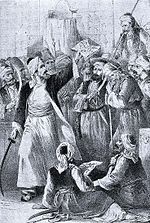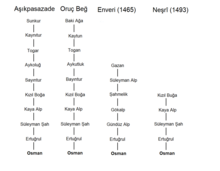Osman I or Osman Ghazi (Ottoman Turkish: عثمان غازى, romanized: ʿOsmān Ġāzī; Turkish: Birinci Osman or Osman Gazi; passed on 1323/4), here and there transliterated anciently as Othman, was the pioneer of the Ottoman Turks and the originator of the Ottoman administration. The line bearing his name later settled and governed the Ottoman Empire (first known as the Ottoman Beylik or Emirate). This state, while just a little Turkmen realm during Osman's lifetime, changed into a world domain in the hundreds of years after his passing. It existed until soon after the finish of World War I.
Because of the shortage of chronicled sources dating from his lifetime, almost no verifiable data about Osman has endured. Not a solitary composed source gets by from Osman's rule. The Ottomans didn't record the historical backdrop of Osman's life until the fifteenth century, over a hundred years after his passing. Along these lines, students of history think that its difficult to separate among actuality and legend in the numerous accounts told about him. One student of history has even ventured to such an extreme as to proclaim it outlandish, portraying an incredible time as a "dark gap".
As per later Ottoman convention, Osman's progenitors were relatives of the Kayı clan of Oghuz Turks. The Ottoman territory was only one of numerous Anatolian beyliks that rose in the second 50% of the thirteenth century. Arranged in the district of Bithynia in the north of Asia Minor, Osman's territory wound up especially very much positioned to dispatch assaults on the powerless Byzantine Empire, which his relatives would, in the long run, proceed to prevail.
Osman's Name
A few researchers have contended that Osman's unique name was Turkish, most likely Atman or Ataman, and was just later changed to ʿOsmān, of Arabic starting point. The most punctual Byzantine sources, including Osman's contemporary George Pachymeres, spell his name as Ατουμάν (Atouman) or Ατμάν (Atman), while Greek sources consistently render both the Arabic structure ʿUthmān and the Turkish form ʿOsmān with θ, τθ, or τσ. An early Arabic source referencing him likewise composes ط as opposed to ث in one occurrence. Osman may consequently have received the more esteemed Muslim name later in his life. Arab researchers like Shihab al-Umari and Ibn Khaldun utilized the name Othman while Ibn Battuta, who visited the district during Orhan I's rule, called him Osmancık. The postfix - cık (or - cuk), demonstrates the diminutive in Turkish, therefore he was known by the name of Osmancik, which signifies "Osman the Little", to separate among him and the third Caliph "Uthman the Great.
Origin of the Ottoman Empire
 |
| 18th century Bust of Osman |
The specific date of Osman's introduction to the world is obscure, and almost no is thought about his initial life and inceptions because of the shortage of sources and the numerous fantasies and legends which came to be told about him by the Ottomans in later hundreds of years. He was in all probability conceived around the center of the thirteenth century, perhaps in 1254/5, the date given by the sixteenth-century Ottoman student of history Kemalpaşazade. As indicated by Ottoman custom, Osman's dad Ertuğrul drove the Turkic Kayı clan west from Central Asia into Anatolia, escaping the Mongol attack. He at that point swore loyalty to the Sultan of the Anatolian Seljuks, who conceded his domain over the town of Söğüt on the Byzantine outskirts. This association among Ertuğrul and the Seljuks, nonetheless, was generally concocted by court writers a century later, and the genuine birthplaces of the Ottomans along these lines stay dark.
Osman got boss, or bey, upon his dad's demise in c. 1280. Nothing is known for sure about Osman's initial exercises, then again, actually, he controlled the area around the town of Söğüt and from that point propelled strikes against the neighboring Byzantine Empire. The main datable occasion in Osman's life is the Battle of Bapheus in 1301 or 1302, in which he crushed a Byzantine power sent to counter him.
Osman seems to have followed the technique of expanding his domains to the detriment of the Byzantines while staying away from the struggle with all the more impressive Turkish neighbors. His first advances were through the passes which lead from the fruitless regions of northern Phrygia close to current Eskişehir into the more ripe fields of Bithynia; as per Stanford Shaw, these victories were accomplished against the neighborhood Byzantine aristocrats, "some of whom were crushed in the fight, others being retained calmly by buy contracts, marriage contracts, and so forth."
 |
Osman Empire
|
Osman's Dream
Osman, I had a close relationship with a neighborhood strict pioneer of dervishes named Sheik Edebali, whose daughter he wedded. A story developed among later Ottoman authors to clarify the connection between the two men, in which Osman had a dream while remaining in the Sheik's house. The story shows up in the late fifteenth-century annal of Aşıkpaşazade as follows:
He saw that a moon emerged from the heavenly man's breast and came to soak in his own breast. A tree at that point grew from his navel and its shade compassed the world. Underneath this shade there were mountains, and streams streamed forward from the foot of every mountain. A few people drank from these running waters, others watered nurseries, while yet others made wellsprings stream. When Osman got up he recounted to the story to the heavenly man, who said 'Osman, my child, congrats, for God has given the supreme office to you and your relatives and my girl Malhun will be your wife.
The fantasy turned into a significant essential legend for the domain, permeating the House of Osman with natural authority over the earth and furnishing its fifteenth-century crowd with a clarification for Ottoman success. The fantasy story may likewise have filled in as a type of reduced: similarly, as Allah vowed to furnish Osman and his relatives with sway, it was additionally certain that it was the obligation of Osman to give his subjects thriving.
Military Victories
As indicated by Shaw, Osman's first genuine successes followed the breakdown of Seljuk power when he had the option to possess the strongholds of Eskişehir and Kulucahisar. At that point, he caught the first huge city in quite a while regions, Yenişehir, which turned into the Ottoman capital.
In 1302, after adequately crushing a Byzantine power close to Nicaea, Osman started settling his powers nearer to Byzantine controlled areas.
Frightened by Osman's developing impact, the Byzantines bit by bit fled the Anatolian open country. Byzantine authority endeavored to contain Ottoman extension, however, their endeavors were ineffectively sorted out and inadequate. Then, Osman spent the rest of his reign growing his control in two ways, north along the course of the Sakarya River and southwest towards the Sea of Marmara, accomplishing his destinations by 1308. That equivalent year his supporters took part in the success of the Byzantine city of Ephesus close to the Aegean Sea, in this manner catching the keep going Byzantine city on the coast, although the city turned out to be a piece of the area of the Emir of Aydin.
Osman's last crusade was against the city of Bursa. Although Osman didn't truly partake in the fight, the triumph at Bursa end up being very crucial for the Ottomans as the city filled in as an arranging ground against the Byzantines in Constantinople, and as a recently enhanced capital for Osman's child, Orhan. Footstool custom holds that Osman passed on soon after the catch of Bursa, however, a few researchers have contended that his demise ought to be put in 1324, the time of Orhan's increase.






No comments:
Post a Comment
If you have any queries or doubts let me know